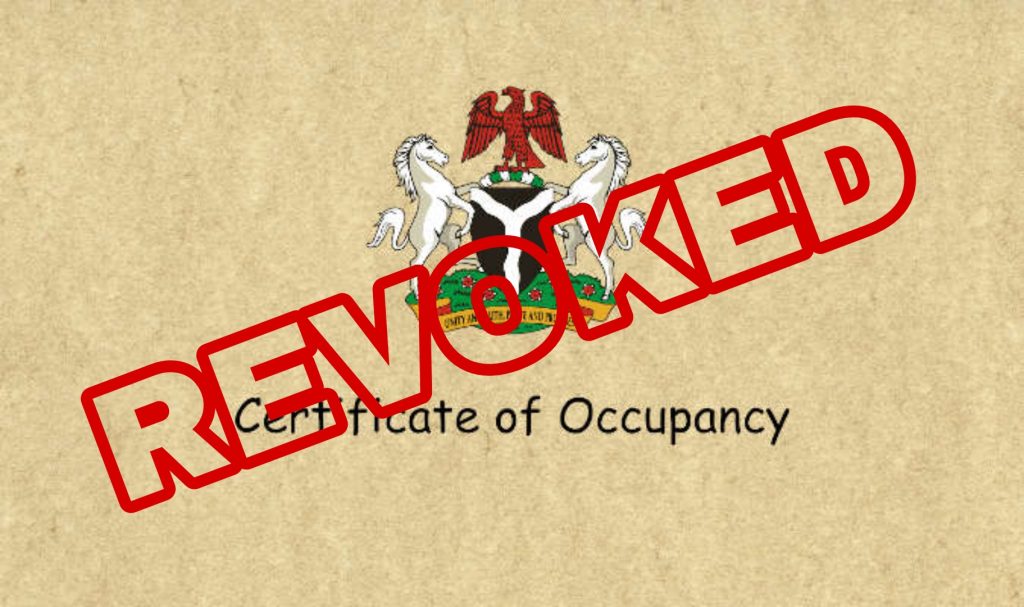Why a Certificate of Occupancy (C of O) Can Be Revoked in Lagos State: A Comprehensive Analysis
Introduction
In Lagos State, the Certificate of Occupancy (C of O) is one of the most important land documents. It establishes a person’s right to own and use a particular parcel of land for a specified period of time, typically 99 years. A C of O provides legal recognition and security of tenure to the holder and is issued by the state government. However, this important document may be subject to revocation in certain circumstances. It is essential that landowners and potential purchasers understand the grounds on which a C of O can be revoked in order to protect their investment and ensure compliance with government legislation. This article examines the main reasons a C of O can be revoked in Lagos State, explaining each factor in detail.
1. Non-Compliance with Development Regulations
One Failure to comply with development regulations set by the state government is one of the main reasons for revoking a C of O. Land owners are usually required to develop their land in accordance with approved plans and within a specified period of time. If a landowner fails to develop the land within the specified time or deviates significantly from the approved development plan, the government can revoke the C of O. Also, none development of allocated lands within the specified period of time stated in the C of O was the reason why the Minister of the FCT announced the revocation of C of O’s associated to 165 plots of land in September 2023. This measure ensures that land is used efficiently and in accordance with urban planning objectives.
2. Illegal or Unauthorized Use of Land
A C of O may be revoked if the land is used for purposes other than those specified in the C of O. For example, if land zoned for residential use is converted to commercial or industrial use without proper permits and approvals, the government has the right to revoke the C of O. This ensures that land use is in accordance with zoning laws and urban planning policies designed to promote orderly development and community welfare..
3. Failure to Pay Ground Rent and Other Statutory Fees
Landowners are required to pay land rent and other statutory fees to the government as set out in the C of O. Persistent failure to meet these financial obligations can result in the C of O being revoked. Land rent is an important source of revenue for the government and its timely payment is enforced to maintain land ownership..
4. Breach of Covenant Terms
Specific covenants and conditions that the landowner must comply with are usually attached to a C of O. These covenants may cover land use, maintenance, environmental protection and other statutory requirements. Failure to comply with any of these covenants may be grounds for revocation. For example, the C of O may be revoked if environmental protection measures are neglected or if activities carried out in the land causes significant environmental degradation.
5. Acquisition by the Government for Public Interest
If the land is needed for an overriding public interest, the government retains the right to revoke a C of O. Such projects may involve building roads, hospitals, schools or other infrastructure. In such cases, the government must provide fair compensation to affected landowners. This process is known as compulsory acquisition or eminent domain. It ensures that land can be used for projects that benefit the wider community.
6. Fraudulent Acquisition of the C of O
The government has the right to revoke the C of O if it is found to have been obtained through fraudulent means, such as providing false information, falsifying documents or other deceptive practices. It is vital to ensure the integrity of the land titling process, and any form of fraud undermines this system and warrants severe penalties, including cancellation.
7. Legal Disputes and Court Orders
There are instances where a legal disputes over land ownership can result in the revocation of a C of O. A court of competent jurisdiction can order for the revocation of a C of O if it finds out that the issuance was improper or that another party has a superior claim to the land. This ensures that land ownership is clear and justly recognized by law.
8. Non-Compliance with Environmental Regulations
Environmental sustainability and compliance is a high priority in Lagos State. This has also been seen in the recent actions of the Lagos State Ministry for Environment. A landowner’s C of O can be revoked if the landowner’s activities on the land cause significant environmental damage or are in contravention of environmental protection laws. This includes activities that result in pollution, deforestation or other forms of environmental degradation that contravene state policy..
Conclusion
The revocation of a Certificate of Occupancy in Lagos State is a serious matter with significant implications for landowners. It underscores the importance of adhering to all regulatory requirements, fulfilling financial obligations, and using land in accordance with its designated purpose. Landowners must remain vigilant and proactive in complying with development regulations, paying statutory fees, and maintaining the integrity of their land use practices. By understanding and adhering to these requirements, landowners can protect their investments and contribute to the sustainable development of Lagos State.

